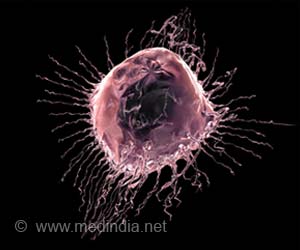Researchers from Toronto, Canada have found that only a small portion of a tumor is responsible for spreading cancer and not all the cells as believed earlier
Researchers from Toronto, Canada have found that only a small portion of a tumor is responsible for spreading cancer and not all the cells as believed earlier.
In this research, mice received human colon cancer cell implants. This caused degeneration of the mice immune systems. The researchers found that a small number of cells, which had a protein called CD133 on their surface, were active in spreading and maintaining cancer.'Nature' published these findings. In the same issue,a group of Italian researchers in Rome, Ruggero De Maria of the Istituto Superiore di Sanita and his colleagues, has also announced a similar discovery. These two studies are the first to show that cancer stem cells are responsible for colon tumours.
This is the fourth type of cancer, after leukemia, breast and brain cancers, in which stem cells have been found to be the source of the disease. This finding supports the view - stem cells may be responsible for all cancers.
'This study will definitely help find more effective treatment options,' feels author John Dick, a professor of molecular and medical genetics at the University of Toronto and a senior scientist at University Health Network. Treating cancer stem cells alone will be a better way of dealing with the disease, says Dick. He compares cancer with a backyard weed. 'You can keep cutting the leaves off the weed, but the weed will regrow,' he explains. 'But if you cut the taproots, the leaves will wither away. Killing the cancer stem cells is the equivalent of killing the root of the weed.'
Dick identified cancer stem cells in a type of leukemia ten years ago. Since then, other researchers have discovered stem cells responsible in breast tumours. Two years ago, Peter Dirks, assistant professor in the University of Toronto's department of surgery discovered stem cells in brain tumours.
'This is a really important additional discovery in a really important human cancer,' says Dirks, also a scientist at the Hospital for Sick Children. He feels, 'That two independent research groups identified colon cancer stem cells reveals the power of this hypothesis'.
Advertisement
To understand the molecular program of colon cancer stem cells seems to be their next step; in addition, to find out if the cells have properties that make them resistant to chemotherapy. They hope the new Ontario Institute of Cancer Research will fund the study
Advertisement
According to World Health Organisation, colon cancer is the fourth most dangerous cancer, killing 655,000 people every year.
Source-Medindia
SRM/ASH/L











